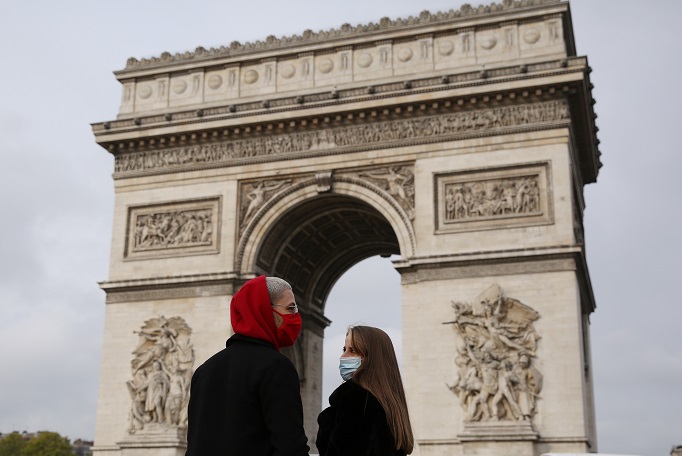EU nations strive to rein in COVID-19 as new cases up
Published : 17 Oct 2020, 02:03
The second wave of COVID-19 continued to exert pressure on Europe on Friday as daily cases surged to new highs in more countries. Faced with the grim picture, the governments have decided to take or mulled over stricter restrictions to contain the coronavirus, reported Xinhua.
TROUBLING TREND
Germany, Greece and Slovenia saw a troubling trend as their new COVID-19 infections within one day set new records on Friday, a day after Italy, Portugal and Lithuania hit their single-day highs.
German national disease control agency, the Robert Koch Institute (RKI), announced Friday that new COVID-19 infections in the country broke Thursday's record with 7,334 cases confirmed within one day, bringing the total number to 348,557.
Thursday's daily figure of 6,638 had marked a jump of some 1,500 over the day before. The previous daily infection peak, at around 6,300 cases, was registered in late March, German news agency dpa reported.
Increased infection numbers were linked particularly to private celebrations with family and friends. However, there were also more COVID-19-related outbreaks reported in older people's homes and nursing homes, according to the RKI.
Helge Braun, head of the Chancellery, told the broadcaster RTL/n-tv that the COVID-19 situation in Germany was "considerably more serious" than in the spring. "We do not expect the numbers to decline tomorrow," said Braun.
Meanwhile, France confirmed 25,085 COVID-19 infections in the past 24 hours, pushing the total count to 834,770, according to data released by health authorities.
The number of new infections was lower than a record 30,621 registered on Thursday, but it remained at a high level unseen during the first wave.
In Italy, the first European country battered by COVID-19, 10,010 new coronavirus infections were reported on Friday, pushing the total number of current active infections to 107,312, showed the latest data from the Ministry of Health.
"We are seeing an acceleration in the evolution of the epidemic, which has entered an acute phase with a progressive increase in the number of cases," the Ministry of Health and the National Institute of Health (ISS) said in their latest weekly monitoring report with reference to Oct. 5-11.
BATTLING SECOND WAVE
More European countries began to turn to tougher measures against the second wave of COVID-19.
British Prime Minister Boris Johnson on Friday defended his government's coronavirus restrictions as "the right and responsible thing to do" in the fight to curb the spread of coronavirus in the country.
"Without action, our health service will be overwhelmed," he said. "I want to avoid another national lockdown."
Also on Friday, the region of Kozani in northern Greece became the first area of the country to enter lockdown during the second wave of the pandemic. Authorities announced that until Oct. 29, protective face masks will be compulsory everywhere, and public gatherings and traveling outside the region are forbidden. Retail shops, restaurants, cinemas, and gyms will remain closed for two weeks.
German Chancellor Angela Merkel and the minister-presidents of Germany's 16 federal states have announced tougher COVID-19 measures this week, but failed to agree on several issues, such as a traveling and accommodation ban or uniform health rules across the country.
Health measures in Germany now include a limit of 10 participants and two households at private events held in those parts of Germany designated as coronavirus hotspots, dpa reported.
They also decided to order pubs and restaurants in these hotspots to close by 11 p.m. The new rules will apply in regions with more than 50 new infections per 100,000 residents within a week, dpa said.
In regions where the rate of new infections has risen to 35 per 100,000 residents over a week, mandatory face mask-wearing is to be expanded to areas where people gather for longer periods.
In Cyprus, Health Minister Constantinos Ioannou said that because of the possibility of the coronavirus to get out of control in the country, President Nicos Anastasiades would chair a meeting of the scientific team advising the ministry to consider new restrictive measures.
In Slovenia, new restrictions kicked in as of Friday in the country's so-called "red" regions.
Two more of Slovenia's 12 statistical regions have been turned from "orange" into "red" on the coronavirus incidence meter, which means that lockdown restrictions now apply in nine regions in total.
Bars, restaurants and sports facilities will close in all "red" regions on Saturday as part of the tightened coronavirus measures.
The government's COVID-19 spokesperson, Jelko Kacin, said the authorities were expected to announce new measures late on Friday.
As the world is struggling to control the pandemic, countries across the globe -- among them European Union members, China, Russia, the United Kingdom and the United States -- are racing to find a vaccine.
According to the website of the World Health Organization, as of Oct. 15, there were 198 COVID-19 candidate vaccines being developed worldwide, and 42 of them were in clinical trials.


